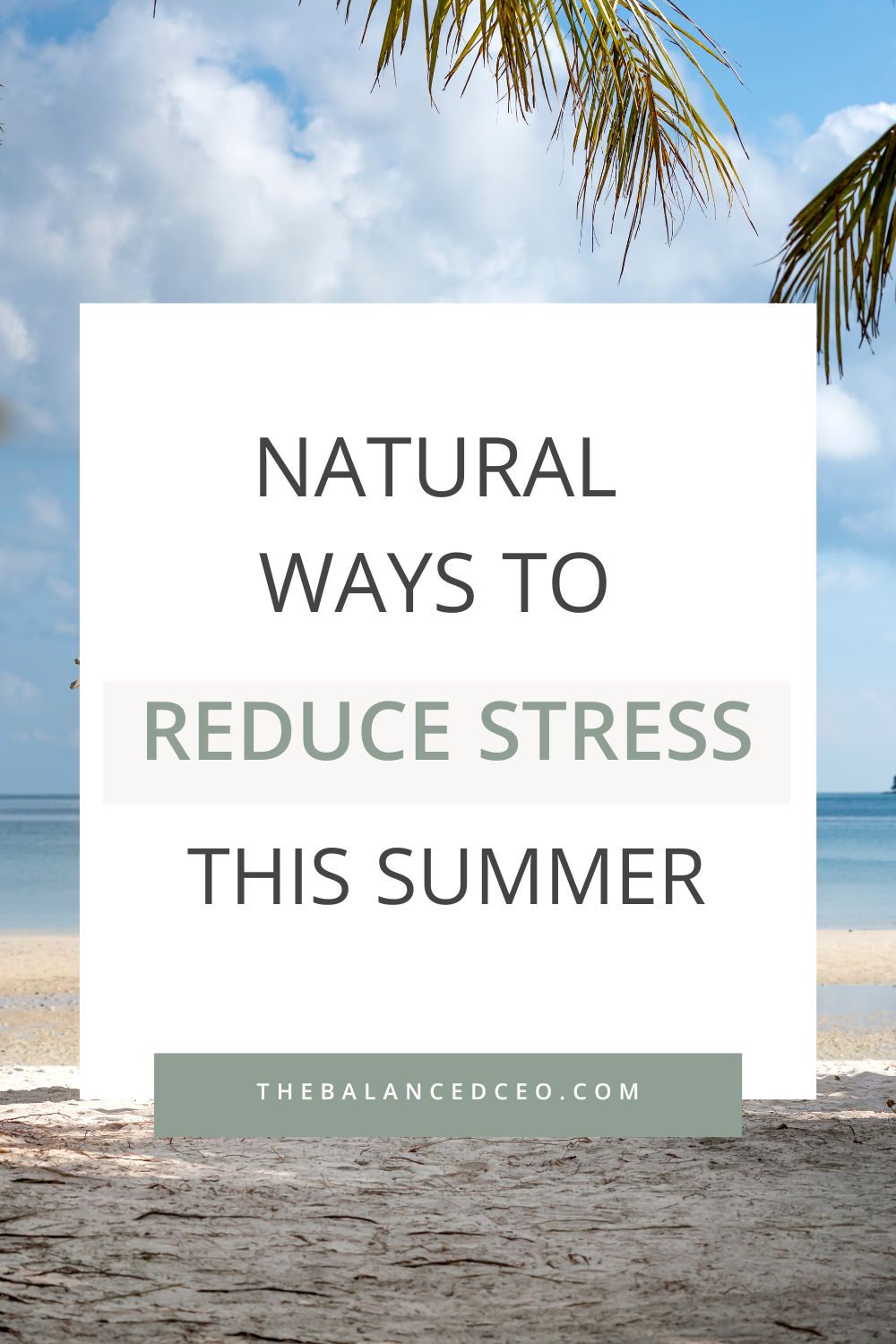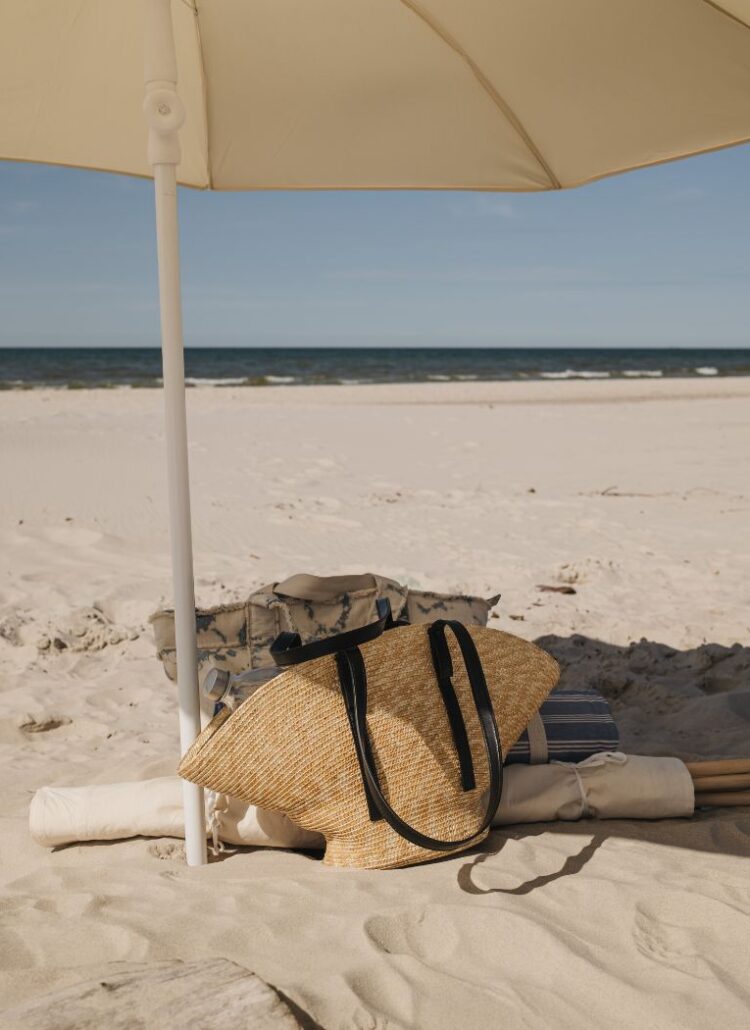This post may contain affiliate links, which means I’ll receive a commission if you purchase through my links, at no extra cost to you. Please read full disclosure for more information.

Everyone experiences stress at some point. Some feel the pressure from overbearing bosses, while others have household responsibilities to tend to. However, if there is a perfect time to tackle stress, it’s summer — the best season to kick back, relax and let your worries disappear.
Fortunately, you don’t need anything fancy or expensive to face your troubles. These tips can help you relieve summertime stress naturally at home.
Are You Stressed? Know the Signs
According to the American Institute of Stress, 87% of Americans worry about inflation and the rising costs of everyday essentials. About 81% and 80% are concerned about global tensions and future cyber and nuclear threats from overseas.
However, those are only a handful of stress factors shared among populations. The COVID-19 pandemic, climate change, school shootings, social injustices and a lagging economy have also preyed on people’s emotions in recent years.
You may be under immense stress and not realize it yet often show the following signs:
- Anger or irritability
- Lack of sleep
- Fatigue
- Increasing or decreasing appetite
- Depression
- Racing thoughts
- Physical responses, such as sweating, shaking, or rapid heartbeat
- Muscle or bodily tension
- Substance abuse
- Feeling overwhelmed or panicky
- Nervous energy
Of course, ignoring chronic stress can negatively impact your overall health and well-being. It can also affect your ability to function day to day.
7 Ways to Reduce Stress This Summer
If your summer is met with undue stress, take a deep breath. These seven techniques will help you relieve pressure and enhance your mood all season.
1. Eat Healthier
Omega-3s — found in salmon, walnuts, and chia seeds — may positively affect mental health. One scientific consensus even suggests they could be an effective treatment alternative for depressive symptoms.
Fill your plates with summer favorites enriched with this essential nutrient. For instance, try grilled salmon with a refreshing side salad and asparagus. A 6-ounce wild salmon contains 1,774 milligrams (mg) of omega-3s, while farmed salmon has 4,504 mg.
You can also make a satiating chia pudding for breakfast using chia seeds, a milk alternative and seasonal berries. Pour your ingredients into a small mason jar and allow it to sit in the refrigerator overnight. The chia seeds will absorb the milk and thicken the liquid base. Although studies indicate different outcomes of foods’ effects on stress and anxiety, eating healthier in the summer is still best for feeling better.
2. Visit the Beach
Warm summer days are ideal for relaxing at the beach and relieving stress. Unplugging for a few hours to enjoy the scenery may take a load off your shoulders and increase your sense of gratitude.
Sunlight is essential for replenishing your body with vitamin D. Studies have shown vitamin D can reduce depressive symptoms while relieving stress and anxiety.
If you can’t visit the beach this summer, a sound machine with ocean waves may improve your sleep. Researchers have found listening to ocean waves during a 45–90 minutes nap is conducive to quality rest.
3. Dapple in Nature Photography
Capture the beauty of nature this summer by taking up photography. According to a 2021 study, photos of forests significantly improved people’s moods and cognition.
Another study of landscape imagery and COVID-related stress suggests nature views positively affect your mental and emotional well-being. The study also highlighted nature exposure’s impacts on gender — women were more deeply affected by earthly scenes than men.
Nature photography is a creative activity you can perfect over time. It’ll also help you slow down and hone your attention to capture the perfect photo.
4. Take a Walk
Physical activity lowers cortisol in the body — known as the stress hormone. While getting up off the couch is difficult for some people with poor mental health, movement boosts endorphins and increases energy levels.
A leisurely walk benefits your physical, mental and emotional health. Research shows you only need to walk for one hour outside for stress relief, so you’ll want to lace up your sneakers and hit the trails near your home this summer. Walking is also a low-impact activity you can do with friends.
5. Practice Mindfulness
One of the more obvious ways to relieve stress during the summer is to adopt a mindfulness practice. For example, meditation sends you into a deep, relaxed state. You can quiet your racing thoughts and worries while strengthening your concentration. Researchers have also found mindfulness techniques are as effective as anti-anxiety medication, meaning it’s a viable alternative to traditional treatments.
You don’t need anything special to meditate. Wear comfortable clothes and situate yourself in a quiet, comfortable place. Then close your eyes and breathe slowly and deeply. Some choose an intention to focus on while others gain self-awareness to live more presently.
6. Go Fishing
A favorite memory is usually fishing with a parent or grandparent. You can relive your stress-free childhood days by picking up this calming activity over the summer.
Fishing boosts your vitamin D levels and lowers your cortisol, like visiting the beach and walking outdoors. Some claim it’s also a meditative experience. Here are other stress-relieving benefits of fishing:
- Reduces anger and irritability
- Lowers your risk of heart attack and stroke
- Reduces blood pressure
- Helps curb emotional eating and prevent substance abuse
- Improves sleeplessness and fatigue
Clear your schedule for an afternoon of fishing at a local pond. Also, consider organizing a weekend fishing trip with close friends or relatives. It’s a great way to bond with others.
7. Start a Garden
Whether or not you’re a beginner, gardening is one of the best ways to relieve stress. According to one study, gardening lowered cortisol levels and improved participants’ moods. Eighty-nine percent and 87% of gardeners said stress relief and relaxation were “extremely” or “very important” gardening effects during COVID-19.
However, gardening integrates other stress-relief techniques. For instance, it’s a physical activity you do outdoors that boosts endorphins. It also allows you to grow an organic food source at home for better nutrition.
Breathe Easier With Stress-Relieving Strategies
If sunshine and longer days aren’t enough to enhance your mood, these stress-relief techniques can take the edge off. Your mental health is crucial, so take special care of yourself this summer.

Cora Gold
Contributor
Cora Gold is the Editor-in-Chief of Revivalist magazine, a publication dedicated to happy, healthy, and mindful living.





Leave a Reply